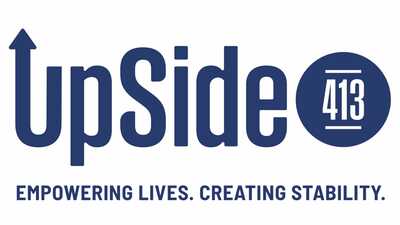Berkshire County Regional Housing Renamed 'UpSide413"
 |
PITTSFIELD, Mass. — The Berkshire County Regional Housing Authority is now called UpSide413, a name that "symbolizes an upward journey towards improvement."
The new alias was announced on Friday after a months-long selection process and was well received by those involved with the organization. The word "authority" is seen as counter-intuitive and 100 percent of stakeholders were in favor of the change.
The new name will not change its work, as it is meant to clarify the services that are offered and the core mission.
"We really wanted a brand or a name that was positive but also uplifting and had that feel to it, but also was a destination," Executive Director Brad Gordon explained.
"And I feel like ‘upside' is a destination actually. We wanted it to feel like a destination for people."
Director of Housing, Legal, and Consumer Services Kristen Curtin was thrilled to start the rebranding process because she has seen firsthand how much it has outgrown the former name.
"I think it was a very thoughtful and deliberate process which sometimes would wake me up at night in a good way," she said.
"I think you will all agree that the new brand really captures that aspirational and positive tone, which is what I think was really needed."
Director of Tenancy Preservation Program/Related Services Kim Borden said that the most important piece is that the name meets the organization's goals "and the goal was to find a name that exuded positivity, diversity, collaboration, just to name a few."
Board member Jay Sacchetti said the name "jumped out" at him and the rebrand will generate conversation about UpSide413.
"It's nice to see a name have positive flavor to it and getting away from all that traditional stuff," he said. "I think that makes people much more comfortable to walk through the front door."
Burns Maxey of the firm Burnsmax was hired to direct the rebranding. Through surveys and interviews of staff members and others with a stake in the organization, it became clear that the name came off as too authoritative.
"This was the point that the word 'authority' came up as being really counterintuitive to the organization and how it doesn't really quite fit the organization and the work that you do," Maxey explained.
"Often I have seen in written works such as annual reports or when staff members are talking about the organization, the first thing they say is what they're not, 'We are not on how a traditional housing authority,' rather than saying what you are, which is what you want to be talking about."
Aside from the misleading nature, it was concluded that the name has been outgrown because the organization's efforts have transcended just housing, though it remains a core focus. Resources such as legal counseling, dispute resolution options, case management support, consumer protection advocacy, and educational forums are provided to ensure clients well being.
The organization has also increased the geographic reach of the Tenancy Preservation Program to serve residents in the Pioneer Valley.
"There were some important aspects that the leadership team really wanted to make sure that the new name captured: that it uses an aspirational and positive tone, it's catchy and memorable, it's not overused in the field, it is unique but has a familiarity to it," Maxey reported.
"Accessibility inclusivity is a big part of the organization so appealing to a broad range of clients as well as being linguistically understandable to a wide range including families, veterans, the houseless, non-English speaking people, and organization partners was important."
Gordon explained that it was an iterative process of integrating all these factors and involved some productive frustration going back and forth between potential names.
"We spent a session really naming these guidance principles, which I think really helped us focus in a more effective manner and guiding us to reach the decision that we reached," he said.
The process officially began in September last year when the board approved the hiring of Burns Maxey to take the lead on its rebranding.
This transition won't happen overnight and the organization will phase in new branded materials, the new logo, updating the social media accounts and website, and answering phones with the new name.
BCRHA will remain the organization's name for filing purposes and it will be doing business as UpSide413 when the new name is officially rolled out in July.
An updated biography on the organization reads:
Based in Pittsfield, MA, UpSide413 promotes household, housing, and community stability through a continuum of interrelated service options. UpSide413 provides various support services aimed at empowering individuals and families to achieve stability in their homes and communities. These services include housing, legal and consumer counseling services, intensive case management and other tenancy preservation and housing stability resources, community based and court connected dispute resolution options, and more in Berkshire County and extending to the Pioneer Valley region.
By offering a comprehensive range of services for over 30 years, UpSide413 aims to address the multi-faceted needs of individuals and communities, ultimately contributing to greater stability and well-being for all involved. Formerly the Berkshire County Regional Housing Authority, UpSide413 is a regional housing authority organized in 1980 pursuant to MGL, Chapter 121, Section 3A. BCRHA's original mission was to serve as a local housing authority for those 23 towns in Berkshire County that do not have a local housing authority.
Tags: Housing Authority,















